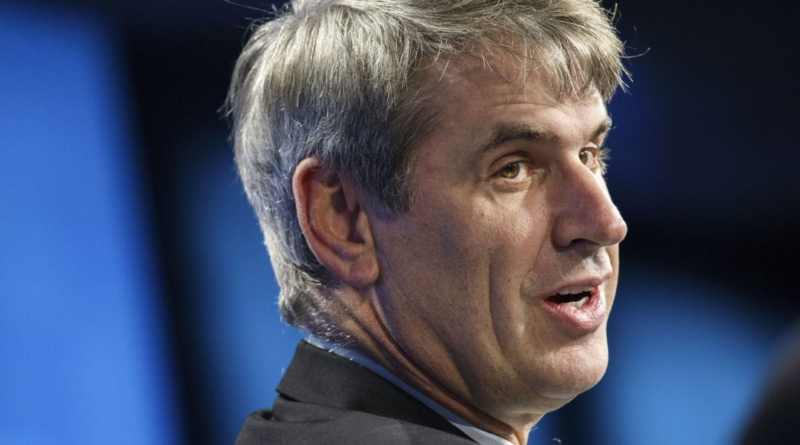Bill Gurley warns of ‘scary’ regulatory capture efforts in the A.I space, hails open-source efforts
Bill Gurley, a well-known venture capitalist, paced onstage at an event this week and asked the audience to yell a sentence that would not normally generate excitement. Gurley, however, received a full-throated response from audience members.
“Regulation is the friend of the incumbent!” they shouted.
Gurley was speaking at the All-In Summit in Los Angeles, an event tied to the mostly tech-focused All-In Podcast. He entitled his presentation “2,851 Miles,” which is the distance between Silicon Valley and Washington, D.C.
Gurley—who as a general partner at VC firm Benchmark has invested in the likes of Uber, Grubhub, and Zillow—warned about the dangers of “regulatory capture.” He described his own experiences butting up against it as he championed innovative startups, and then warned about its role today in the space of artificial intelligence.
To explain the concept, he quoted George Stigler, winner of the 1982 Nobel Prize in economics, who said, “as a rule, regulation is acquired by the industry and is designed and operated primarily for its benefit.” In other words, a special interest is prioritized over the general interest of the public.
Gurley recounted his experiences with Tropos Networks, in which Benchmark invested. He described how mayors were initially excited by the company’s wireless mesh networking technology, hoping to use it to offer municipal wi-fi services.
“There were hundreds of mayors all over the country that wanted to provide free wi-fi service across their downtown area,” said Gurley. “It would help with public safety, economic development, and of course the digital divide.”
Unfortunately, he said, the idea “collided with commercial interest,” namely incumbents with powerful lobbyists. In Philadelphia, he said, Verizon and Comcast used lobbyists to push bills through the Pennsylvania legislature that would protect their positions from upstart challengers like Tropos. Soon more such regulations spread to other states.
Regulatory capture risk in A.I.
Gurley presented a few other examples of regulatory capture before highlighting a case that’s more relevant today: A.I.
He shared onscreen a New York Times article from May entitled, “OpenAI’s Sam Altman Urges A.I. Regulation in Senate Hearing.”
“Sam’s just getting started,” Gurley said, referring to OpenAI CEO Sam Altman. “He wants regulation, too.” OpenAI, the maker of A.I. chatbots ChatGPT and GPT-4, is widely seen as being far ahead of rivals.
“There’s a really scary thing in this A.I. space,” Gurley said. “The incumbents that are running to meet with…the government are spreading something that I don’t think is accurate or fair: They’re spreading a negative open-source message, and I think it’s precisely because they know it’s their biggest threat.”
If large language models (LLMs)—which power A.I. chatbots like ChatGPT—are open source, the reasoning goes, more startups will be able to innovate and challenge incumbents. By contrast, the LLMs of OpenAI and Google (with its ChatGPT rival Bard) are not generally available for public scrutiny.
Tesla CEO Elon Musk, who cofounded OpenAI but later drifted away from it, tweeted in February: “OpenAI was created as an open source (which is why I named it ‘Open’ AI), non-profit company to serve as a counterweight to Google, but now it has become a closed source, maximum-profit company effectively controlled by Microsoft. Not what I intended at all.”
Altman and Microsoft have denied this characterization, and Ilya Sutskever, OpenAI’s chief scientist and cofounder, shared his thoughts on the reasons for the switch away from open source in an interview with The Verge in March:
“We were wrong. Flat out, we were wrong. If you believe, as we do, that at some point, A.I.—AGI—is going to be extremely, unbelievably potent, then it just does not make sense to open-source. It is a bad idea…I fully expect that in a few years it’s going to be completely obvious to everyone that open-sourcing A.I. is just not wise.”
He added that “at some point it will be quite easy, if one wanted, to cause a great deal of harm with those models.” He also noted, however, that “the safety side is not yet as salient a reason as the competitive side,” and “there are many, many companies who want to do the same thing.”
Altman himself told lawmakers in May, “We don’t wanna slow down smaller startups. We don’t wanna slow down open source efforts,” while adding, “We still need them to comply with things.”
Marc Andreessen, a general partner at VC firm Andreessen Horowitz, has railed against regulatory capture in the A.I. space, warning in June of “CEOs who stand to make more money if regulatory barriers are erected that form a cartel of government-blessed AI vendors protected from new startup and open source competition.”
Gurley said Llama 2 from Meta, one of the leading open-source LLMs, “is actually super interesting.”
Silicon Valley notables including Andreessen, YCombinator cofounder Paul Graham, and Greylock partner Reid Hoffman have signed a statement of support for Llama 2 that reads:
“We support an open innovation approach to AI. Responsible and open innovation gives us all a stake in the AI development process, bringing visibility, scrutiny and trust to these technologies. Opening today’s Llama models will let everyone benefit from this technology.”
Towards the end of his presentation, Gurley warned that “if you care about prosperity and you kill innovation, you’re going to kill prosperity.”
He ended his talk by referring back to its “2,851 Miles” title.
“The reason Silicon Valley has been so successful,” he said, “is because it’s so f***ing far away from Washington, D.C.

